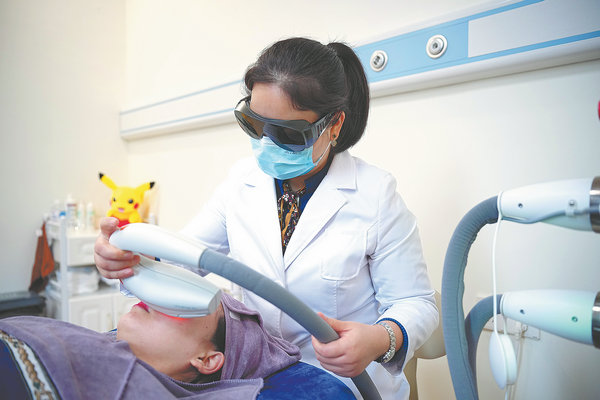Noninvasive treatments spur beauty biz


Nonsurgical cosmetic procedures will burgeon into a new growth opportunity for China's medical aesthetics industry, with noninvasive aesthetic techniques increasingly favored by beauty enthusiasts amid advanced regulations, said experts.
"Consumption of nonsurgical aesthetic treatments, which are characterized by high-level safety, short recovery time, low risk and affordable prices, has continued to rise despite lingering COVID-19 impact," said Jin Xing, chairman and CEO of SoYoung, an online cosmetic treatment platform.
The sector, Jin said, will continue to dominate the medical aesthetics market this year, with skin management and anti-aging being the two largest segments in terms of demand.
According to the latest SoYoung data, by 2030, the market size of China's nonsurgical medical aesthetics sector is expected to reach 415.7 billion yuan ($57.4 billion), nearly double the market size of surgical medical aesthetics.
Specifically, injectable procedures such as botulinum toxin — sometimes referred to as Botox by patients — products, hyaluronic acid fillers, radio frequency and light therapy like Thermage and Ultherapy, and intense pulsed light (IPL) technologies are gaining traction in the field of nonsurgical treatment, said a report from SoYoung.
"For example, radio frequency and light therapy can penetrate deeper layers of skin tissue to help lift, smooth and rejuvenate the skin without surgery or extensive downtime, yielding significant aesthetic enhancements," said Wang Zhongjie, director of Beijing-based cosmetic surgery chain BeauCare Clinics and T.Mei BeauCare Clinic.
"Nonsurgical methods have offered me alternatives with greater flexibility, minimal trauma, shorter recovery time and lower risks compared to traditional surgical procedures," said a Beijing-based consumer surnamed Chen, who recently underwent IPL treatment.
"I've been a 'surgery-phobe' and I'd still definitely opt for noninvasive measures for cosmetic improvements in the future, if necessary, because I believe them to be much safer," Chen said.
With the aforementioned advantages, the nonsurgical sector is gaining the upper hand in the overall medical aesthetics market.
Globally, surgical procedures accounted for 44.3 percent of the total in 2022, while nonsurgical procedures accounted for 55.7 percent, according to a report from the International Society of Aesthetic Plastic Surgery released in September last year.
As the platform economy thrives in the Chinese market, online orders for cosmetic procedures also seem to be dominated by nonsurgical ones. According to a November 2023 report from the Qianzhan Industry Research Institute, nonsurgical orders accounted for 84 percent of the online total in 2022, rising from 62 percent in 2017.
However, while emerging trends such as social media and livestreaming have broken down information barriers, forming a close connection between the platform economy and the growth of cosmetic treatment, there are also growing concerns about the industry's over-reliance on digital marketing for customer acquisition.
"Some medical aesthetics institutions are leveraging livestreaming to promote their services with attractive prices. This seems to be unreasonable to me because consumers, who lack necessary professional knowledge, may place orders before consulting a doctor, which could prove risky even if they do so for nonsurgical treatment," Chen, the cosmetic procedure consumer, said.
In pursuit of growth, some market entities focus more on brand promotion and sales, with doctors "merely delivering hyaluronic acid products" and having lower participation in the entire diagnosis and treatment process, which is not conducive to the long-term healthy development of the nonsurgical cosmetic sector, said Li Bin, founder and chairman of BeauCare Clinics Medical Investment Group Co Ltd.
Li said: "Especially in the cosmetic injection sector, with the increasing richness of upstream products, the emergence of new materials and technologies may slow down, leading to a greater emphasis on the comprehensive use of existing materials.
"This important market change will further test doctors' skills and expertise in delivering safe and effective treatments, and the importance of doctors in the entire industry chain will be further strengthened."
With the medical aesthetics industry pursuing high-quality development, China is stepping up efforts to advance relevant supervision and regulations. In May 2023, the State Administration for Market Regulation and 10 other departments jointly issued guidance on further strengthening the supervision of the medical aesthetics industry. The document clearly defined medical aesthetics services as a kind of medical activity, and stressed higher-level standards for the regulation of the industry.
"Moving forward, the industry is expected to see the rise of more standardized medical aesthetic institutions, with a focus on professional and advanced medical prowess to deliver high-quality services and drive sustainable growth," said Jing Xuan, vice-secretary-general of the Chinese Association of Plastics and Aesthetics.




































